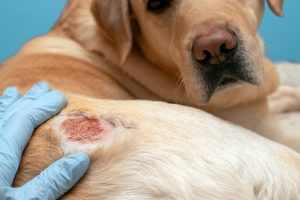If you have a pet that is suffering from itchy skin, rashes, or other skin-related issues, you’re not alone. Skin allergies are a common problem among our furry companions, and they can cause discomfort and frustration for both the pet and their owner.
In this blog, we will explore the causes, symptoms, and most importantly, effective strategies to manage skin allergies in dogs and cats. This will help inform you of the next steps towards a veterinarian consultation. Let’s dive in and learn how to give our four-legged friends the relief they deserve.
Understanding Skin Allergies
Skin allergies in dogs and cats can be a source of discomfort and distress for our beloved pets. Understanding the nature of these allergies is essential in order to effectively manage them. There are several types of skin allergies that can affect our furry friends, including atopic dermatitis, flea allergy dermatitis, and food allergies. These allergies can cause a range of symptoms, such as itching, redness, inflammation, and even secondary infections.
Identifying the triggers or allergens that cause these reactions is crucial for developing an appropriate treatment plan. Common allergens can include pollen, dust mites, certain foods, fleas, and even certain substances in the environment. By understanding the specific allergens that affect your pet, you can take steps to minimise exposure and alleviate their discomfort.
Diagnosis And Veterinary Examination
If you suspect that your pet is suffering from skin allergies, it is important to seek professional veterinary assistance. A veterinarian will conduct a thorough examination to diagnose the underlying cause of the skin issues. They will take a detailed medical history, inquire about your pet’s symptoms, and perform a physical examination of the affected areas.
In some cases, additional diagnostic tests may be necessary to pinpoint the exact cause of the allergies. These tests may include skin scraping, blood tests, or allergy testing. Allergy testing can help identify specific allergens that are triggering your pet’s reactions. This information is crucial for developing an effective treatment plan tailored to your pet’s needs.
Managing Skin Allergies
When it comes to managing skin allergies in dogs and cats, a multi-faceted approach is often necessary to provide relief and improve your pet’s quality of life. Here are some key strategies to consider:
Environmental Management
Creating an allergen-free living environment is crucial. Regularly clean your pet’s bedding, vacuum your home, and consider using air purifiers to reduce airborne allergens. Minimising exposure to common allergens such as pollen, dust mites, and mould can greatly alleviate symptoms.
Grooming and Bathing
Regular grooming is essential for pets with skin allergies. Bathing your pet with a gentle, hypoallergenic shampoo can help soothe the skin and remove allergens. Be careful not to over-bathe, as excessive washing can strip the skin of its natural oils and cause dryness.
Parasite Prevention
Fleas and other external parasites can worsen skin allergies. Ensure your pet is on a comprehensive parasite prevention program to minimise the risk of infestations. Regularly check for fleas and ticks, and consult with your veterinarian about appropriate preventive treatments.
Topical Treatments
Topical treatments can provide temporary relief for itchy skin. There are various creams, sprays, and gels available that can help soothe irritated skin and reduce inflammation. Always consult with your veterinarian before using any topical treatment on your pet.
Medications
In some cases, medications may be necessary to manage severe skin allergies. Antihistamines, steroids, and immunosuppressive drugs can help alleviate symptoms and control the allergic response. These medications should only be used under the guidance and supervision of a veterinarian.
Diet and Nutrition
Diet plays a significant role in managing skin allergies in dogs and cats. Food allergies can contribute to skin problems, and identifying and eliminating potential allergens from your pet’s diet can make a big difference. Your veterinarian may recommend a hypoallergenic or limited-ingredient diet to help identify and avoid triggering ingredients.
It’s important to follow your veterinarian’s guidance when selecting an appropriate diet for your pet. They may recommend novel protein sources or hydrolysed diets that are designed to minimise the risk of allergic reactions. Additionally, supplements such as omega-3 fatty acids can help support skin health and reduce inflammation.

Medications and Topical Treatments
In some cases, medications and topical treatments may be necessary to manage the symptoms of skin allergies in dogs and cats. These treatments can provide relief from itching, inflammation, and discomfort. Here are some common options:
Antihistamines
Antihistamines can help block the release of histamines, which are responsible for allergic reactions. They can help reduce itching and inflammation in mild to moderate cases. It’s important to note that not all antihistamines are safe for pets, and the appropriate dosage should be determined by your veterinarian.
Steroids
Steroids, such as corticosteroids, can be highly effective in managing severe allergic reactions. They help reduce inflammation and alleviate itching. However, long-term use of steroids can have side effects, so they are typically used for short-term relief or in specific situations as advised by your veterinarian.
Topical Treatments
Topical treatments, such as creams, ointments, and sprays, can provide localised relief for itchy and inflamed skin. They can help soothe the affected areas, reduce redness, and promote healing. It’s important to choose products specifically formulated for pets and to follow your veterinarian’s instructions for application.
Immunomodulatory Medications
Immunomodulatory medications work by modifying the immune response to reduce allergic reactions. These medications are typically used in cases where other treatments have not been effective or when long-term management is required. They require careful monitoring and should only be prescribed and administered by a veterinarian.
Allergen-Specific Immunotherapy
Allergen-specific immunotherapy, commonly known as allergy shots, is a treatment option that aims to desensitise your pet’s immune system to specific allergens. This treatment involves gradually exposing your pet to small amounts of the allergen over time, allowing the immune system to build tolerance.
The process begins with allergy testing to identify the specific allergens triggering your pet’s reactions. Once identified, a customised vaccine is formulated to target those allergens. The vaccine is administered through a series of injections, usually given at regular intervals over several months or years.
Allergen-specific immunotherapy can be a highly effective long-term solution for managing skin allergies. It helps to reduce the severity of allergic reactions, minimise the need for medications, and improve your pet’s overall quality of life. This treatment option should be discussed with your veterinarian to determine if it is suitable for your pet’s specific condition.
Final Thoughts
Managing skin allergies in dogs and cats requires a comprehensive approach that combines various strategies to provide relief and improve your pet’s well-being. By understanding the causes, seeking veterinary diagnosis, and implementing appropriate management techniques, you can help alleviate your pet’s discomfort and support their skin health.
At Toorak Road Veterinary Clinic, we are dedicated to providing exceptional care for pets with skin allergies. Our experienced veterinary team can guide you through the diagnosis process, recommend suitable treatment options, and offer valuable advice on managing your pet’s condition. We understand the impact that skin allergies can have on your pet’s quality of life, and we are committed to helping them find relief.
Please do not hesitate to call us today on (03) 9809 2700 or make an appointment.

